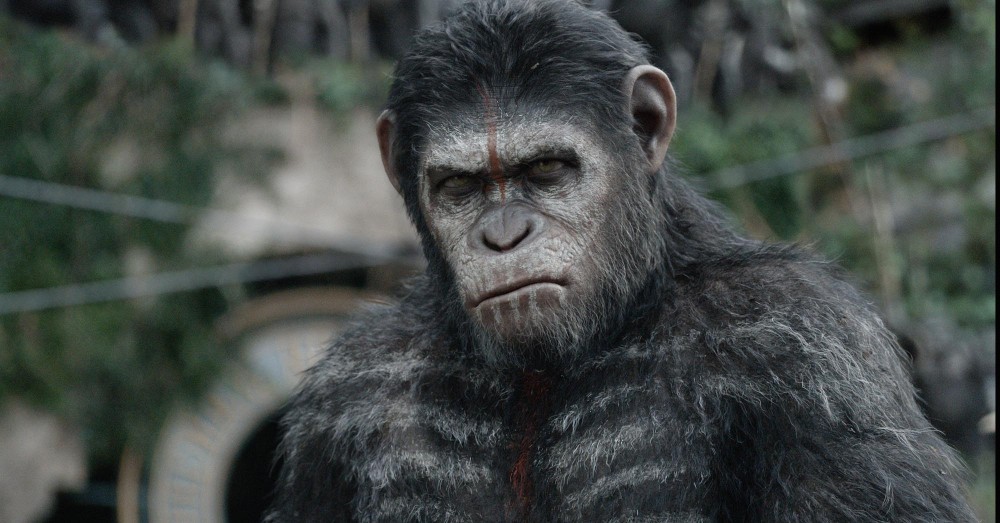
To kick off this review, I’ll start by talking about something I’ve noticed in, and mentioned about, practically every blockbuster this year: the differences between humans and non-humans. So many films this year (Godzilla, X-Men, and even Transformers) have attempted to sort of tackle the distinction between humans and their on-screen counterparts (be they giant monsters, giant robots, or crazy mutants). While all of them have succeeded in some regard, none has really nailed just how important or useless humanity really is within the confines of their script. Smack in the middle of the summer, we’ve got another film to add to this list, and arguably one that does it better than the rest. It’s the latest addition to a series that has always found interest in depicting the wicked ways of whatever the superior species is, and its title is Dawn of the Planet of the Apes.
As one of the few folks who wasn’t particularly blown away by Rupert Wyatt’s Rise of the Planet of the Apes, the shift in director (and narrative direction as well) was a pleasant one. Matt Reeves, who I appreciate more than I should probably admit because of Cloverfield and Felicity, makes for a stellar choice this go-round, really reveling in the dark atmosphere that the film creates. His stylistic touches only occasionally slide into the typical bland action format, with disappointing scenes featuring apes swinging machine guns around while riding horses. The film’s grace is most notable in the first act. While Rise was the kind of film that leaned towards a restrained, scientific approach, Dawn doesn’t slow down for a single minute. Reeves, returning writers Rick Jaffa and Amanda Silver, and newcomer to the series Mark Bomback (whose career I’m not at all fond of frankly), know better than to focus on the science that made the apes who they were anymore. Instead, the only hint of a virus film we get is in the opening credits of sorts, where we watch actual news clips cut down to tiny bits implicating the slow takeover of the apes.
As their rise has already been established by the first few moments, the film wastes no time in throwing us straight into ape politics, and chooses to center the action on them more so than the humans involved (Jason Clarke, Keri Russell, Kodi Smit-McPhee). In its most impressive moments, we watch Caesar (Andy Serkis), Koba (Toby Kebbell), and a multitude of other apes, communicate through sign language, with accompanying subtitles. It’s the kind of move that could arguably turn off your typical blockbuster crowd, but it fits beautifully with the narrative, and it’s something that should have remained throughout the film. In many ways, the relationships between apes unfold as typically as any other movie featuring a coup. What it all calls to mind, simply because of its heavily Shakespearean narrative and its inclusion of animals fighting for a kingdom (one of which has a large scar across his face), is The Lion King.
While it doesn’t retain any of Shakespeare’s flowery dialogue — sentences mostly being stripped down for the sake of the apes slowly grunting out their words like the humans that surround them — it’s still a tragedy through and through. Even with its predictable turns, the script remains tighter than one might expect the over-two-hour work to be. It moves as swiftly as it can, occasionally stopping for some fairly bland family drama (in both the human and ape narratives) between large action set pieces and genuinely interesting scenes with the apes. Even one of the film’s final sequences, already long past the point where anyone in the audience knows everything that will unfold in the rest of the film, manages to captivate solely due to the impressive pacing, effects, and camerawork.
At its very core though, Dawn of the Planet of the Apes is all about showing off just how much they can do with motion capture technology. Both Serkis and Kebbell always draw the eye, chewing the scenery with the glorious faces that the visual effects team have provided them. While the effects and two main performers shine though, there’s a lot of character development sacrificed solely to focus on them. “Let’s get another close-up on Andy getting really angry about something while the only two women in the movie either lay there being sick or act as a tool to make the other one less sick,” the film almost seems to say. It’s understanding not to want to focus on side-characters or humans, but there won’t ever be a day I don’t complain about Keri Russell (who you should all be watching on The Americans) being wasted in a film when she could be a more prevalent figure.
For a franchise that kicked off with an important bit of social commentary for the world, it’s a little sad to see the series continue to stray further and further away from that. Yet, even with that criticism, Dawn may confront what it means to be human and what it means to be monster better than most blockbusters this year. Regardless of its lack of commentary and use of an incredibly predictable narrative, Dawn of the Planet of the Apes manages to be a better installment to the series than its precursor Rise was, if only becomes it embraces and exploits its motion capture technology as much as physically possible.
–
Dawn of the Planet of the Apes is currently available for pre-order on Blu-ray, DVD
, and Amazon Instant Video
.
Directed by Matt Reeves; written by Rick Jaffa, Amanda Silver, and Mark Bomback; Andy Serkis, Jason Clarke, Gary Oldman, Keri Russell, Toby Kebbell, and Kodi Smit-McPhee; 130 minutes.



 Derek
Derek
 Isabelle
Isabelle